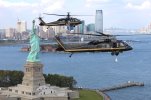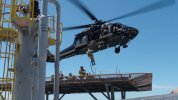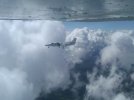I am recruiter/AIA for Air and Marine. Below is a thread I recently posted on Baseops.net, it should answer most of your questions? If not, please post your question and I will answer it in a day or two. If you are interested in applying, do not use USAJOBS. Send me an email,
rw_leo@outlook.com and I will apply direct for you. It is much easier, the customer service is better, and it is 4-6 weeks quicker.
The only polygraph waiver is for TS/SCI and you must be read into a program, waivers are not approved for secret clearances yet. The legislation is out there, but it sponsored by Jeff Flake who is retiring this year. We are not optimistic.
Below is my OP:
Customs and Border Protection, Air and Marine Operations (AMO), is actively hiring military and civilian pilots for their Air Interdiction Agent Positions. AMO is CBP's law enforcement wing and is located along the borders, Puerto Rico, and certain urban locations.
I have assisted with Air Interdiction Agent recruiting and attended multiple recruiting events. Inevitably, the same questions are asked time and time again. The purpose of this thread is to provide the answers to these frequently asked questions. The position is very military friendly and offers benefits many civilian employers do not. The biggest is the ability to buyback your military years into our retirement system if you separate from service.
Below are the answers to the most frequently asked questions, the reference, and if a reference is not available I provided the best answer I have. This is not an “official” forum, I am giving you my best answer. If you have additional questions, please post them to the thread or email me directly at
rw_leo@outlook.com. I am not a full time recruiter, I am a line pilot who assists with recruiting. Please allow a day or two for a response.
If you would like to apply, please contact me at the email provided. DO NOT APPLY THROUGH USAJOBS! I can submit your application directly, it saves you time and establishes a clear line of communication. The hiring process can be very frustrating, we are doing our best to keep applicants informed.
How many hours do I need before I can apply?
Flight hours can be waived down to 1000-hours for specific experience, contact me for more specifics.
I am over 40 years old, can I apply?
Yes, if you are a veteran. You are permitted to complete twenty years as a federal agent to receive a retirement.
“In instances where the maximum entry-age is waived, the corresponding mandatory retirement age for these individuals will also be higher because it will be reached after 20 years of Law Enforcement Officer (LEO) service for the entitlement to an immediate enhanced annuity.” See below, it is under Age Qualifications.
https://www.opm.gov/policy-data-oversight/veterans-services/vet-guide-for-hr-professionals/
Should I get my ATP before I apply?
It is not required.
Do I have to take a polygraph?
Yes. If you have a TS/SCI clearance you are eligible for a waiver. Legislation is currently in the Senate which permits applicants with a Secret clearance with a reinvestigation in the past five year to apply for a waiver.
https://www.congress.gov/bill/115th-congress/senate-bill/595
Are waivers guaranteed?
No.
Does Air and Marine administer the polygraph?
No.
When will I get called for my interview and checkride?
Once your background investigation is complete.
Where is my checkride and what does it include?
The process includes an interview, oral evaluation, and flight check. (Similar to a commercial checkride.) It is conducted in Oklahoma City.
How long does the process take?
4-6 months
When can I apply if I am in the military?
One year from your terminal leave date, you can attend the academy on terminal leave.
When will I find out where I am assigned?
Approximately 2-3 months prior to your academy date.
When will I find out my academy date?
Shortly after a successful checkride/interview.
Do you carry weapons?
Yes, we are federal agents and serve in a law enforcement capacity.
What assignments are available?
See USAJOBs and search “Air Interdiction Agent.” Location, requirements, etc are listed in the announcement.
How long do I have to stay in my first assignment?
Minimum time is three-years. After three-years, you can apply to relocate to locations with a vacancy.
Am I guaranteed the transfer?
No, however agents leaving “hard to fill” locations take priority for assignment. FAA ratings, aircraft at the requested assignment, and manning will also be considered.
What is a hard to fill location?
Laredo, TX, McAllen, TX, Sierra Vista, AZ, Puerto Rico, North Dakota, and one or two other Southwest border locations.
Will I be force transferred?
Everyone signs a mobility agreement and transfers have occurred. Generally speaking, most transfers occur to agents who choose to pursue leadership positions.
What is my rank/grade? When do increases occur?
The position is entry level GS11 journey to GS13; GS11 your first year, GS12 your second year, GS13 year three. After GS13 you increase in steps unless you choose to pursue a leadership (GS14) position. Increase in GS level is dependent on satisfactory performance.
What is a step?
An increase in pay for years of service. “Each grade has 10 step rates (steps 1-10) that are each worth approximately 3 percent of the employee’s salary. Within-grade step increases are based on an acceptable level of performance and longevity (waiting periods of 1 year at steps 1-3, 2 years at steps 4-6, and 3 years at steps 7-9). It normally takes 18 years to advance from step 1 to step 10 within a single GS grade if an employee remains in that single grade.”
https://www.opm.gov/policy-data-oversight/pay-leave/pay-systems/general-schedule/
What is LEAP? What does it do for my pay?
LEAP is “Law Enforcement Availability Pay” and it adds an additional 25% to your annual salary. Remember it is availability pay, it is not required to be worked. Quick example: My work day is 8-hours a day. If I have a 10-hour day for an investigation, I get paid 8-hours for my duty day and the other 2-hours are covered by LEAP.
https://www.opm.gov/policy-data-oversight/pay-leave/pay-administration/fact-sheets/availability-pay/
How much money will I make each year?
Add 25% to the figures provided in this table.
https://www.opm.gov/policy-data-oversight/pay-leave/salaries-wages/2017/law-enforcement-officer/
How much leave do I receive annually?
This depends on years of service, which includes active duty years. Ex: If you have 5 years of active duty, look at the 3-15 year column. This is hours per pay period which is two weeks. (Active duty retirees are in the 4-hour column)
https://www.opm.gov/policy-data-oversight/pay-leave/leave-administration/fact-sheets/annual-leave/
Do I get any other leave?
Yes, we get 4-hours per pay period for sick leave. Also, qualifying military servicemembers receive military leave. This is discussed later.
How does leave at the branch work?
Leave is not like the military, we can take 30-minutes to 8-hours. If you want a four-day weekend, you take 16 hours. Assuming you are working a normal Mon-Friday schedule. If you want to take an hour in the morning, take one hour and not 0.5 days.
What is your schedule?
We are required to work 5-days a week for 8-hours each day. Ex: Mon-Friday, Sunday-Thursday, Tuesday to Saturday.
Do I get paid the same for each work day and time?
No, we receive differential pay for night and Sunday work.
https://www.opm.gov/policy-data-ove...fferential-for-federal-wage-system-employees/
Do you travel a lot?
Not like the military, this really depends on your location and mission. On average, I would say 1-5 days a month. This includes missions and all training.
What is my retirement package?
You must complete 20-years of law enforcement (LE) time to receive a law enforcement retirement.
As federal employees we are entitled to the Federal Employee Retirement System (FERS). The system includes a defined benefit, thrift savings plan, and Social Security. Explained further below:
Defined Benefits:
1.7% of your high-3 average salary multiplied by your years of service which do not exceed 20, PLUS 1% of your high-3 average salary multiplied by your service exceeding 20 years Ex: 20 years equals 34% of your high three. 25 years is 39% of your high three.
Employees have to pay 3.1% of their salary into the FERS retirement.
https://www.opm.gov/blogs/Retire/2013/5/13/FERS-Revised-Annuity-Employee-FERS-RAE/
Thrift Savings Plan:
Matched for a total of 5% (1% automatic agency, 4% employee match)
https://www.tsp.gov/PlanParticipation/EligibilityAndContributions/typesOfContributions.html
Social Security:
Very individual figure, here is what the FERS guide states “You should go to your local Social Security district office to obtain information about your eligibility for and amount of these benefits. “
https://www.opm.gov/retirement-services/publications-forms/pamphlets/ri90-8.pdf
I cannot stay 20-years, do I get a retirement?
Yes, you recieve a deferred annuity. My understanding, it is 1% per year and begins paying at 62 years old. You must serve a minimum of 5-years to receive a deferred annuity.
https://www.opm.gov/retirement-serv.../types-of-retirement/#url=Deferred-Retirement
Do my military years add to my retirement?
Yes, if you buy them back into the FERS system. (See below)
How much does it cost and what does it add to my retirement?
It costs 3% of your total estimated earnings for a FERS addition of 1% to your retirement per year. Simplifying the process, you send a DD214 to DFAS. They determine how much you made over your active duty career and send it back. Once you receive your estimated earnings, you send it to Office of Personnel Management (OPM) and they calculate your payment. Ex: I served 10 years and made 500,000$. As an employee, you are required to pay 15,000$ for an additional 10% onto your retirement.
https://www.opm.gov/retirement-serv...r/webcast-presentations/military-deposits.pdf
Do I have to pay all the money upfront?
No, I currently pay 100$ a pay period. (2-weeks)
Can I stay in the National Guard or Reserves?
Yes, you are also authorized 120-hours per year to conduct military obligations.
Do I lose my years I bought back?
No. If you choose to complete 20-years of military service those years you “bought back” are used for your DHS and DOD reserve retirement. Yes, you get two defined retirements. Good deal.
What if I am deployed while in the military?
You are entitled to five years of military service. It is unpaid and may be “bought back” like other active duty time.
Some information is located here:
https://www.opm.gov/policy-data-oversight/veterans-services/vet-guide-for-hr-professionals/
I am receiving a 20-year active duty retirement; can I buy back years?
Yes, but you cannot simultaneously receive your DOD annuity.
https://www.opm.gov/retirement-services/fers-information/military-retired-pay/
I want to move into a leadership position, how does that work?
Internal announcements are posted for specific positions. These positions are competitive and most are GS-14 positions.
What will I fly?
It depends on the aircraft available at your assigned location. Most locations have one or two of the following rotary wing aircraft: EC120, AS350, UH1, or UH60. Fixed wing, most have the C206 or C210. Less common are the King Air, Dash 8’s, PC12, P3’s and the C550
How many aircraft can I fly?
Up to three, most AIA’s fly two.
I am dual rated and have not flown helicopters (or airplanes) in years, will I be able to fly both?
Most likely, yes. Ultimately, it depends on the needs of your branch and aircraft availability
Will I fly a lot?
Depends on location, maintenance, weather, etc. Most fly from 200-500 hours annually.
Are there additional/collateral duties?
Yes, but one is not mandatory like the military. Example: Firearms instructor, instructor pilot, maintenance pilot, safety, and operations.
What do you do when not flying?
Studying, physical training, computer based training, etc. We also have quarterly, semi-annual, and annual requirements. Firearms, law review, etc
Will they send me to get my fixed wing or helicopter ratings? Flight Instructor?
This is very case by case and I do not know the correct answer. I have seen agents sent to training for their Commercial Helicopter, Single Engine, Multi-Engine, CFI, CFII, etc. Most likely, it depends on your locations needs.
Where is the flight training conducted?
Depends. Most of our training is civilian contractor; Flight Safety, SIMCOM, etc. You are also required to take an annual checkride at your branch.
Where is the academy and how long is training?
Initial training is at the Federal Law Enforcement Training Center in Brunswick, GA and lasts approximately 14-16 weeks.
Below are a few pictures I got from guys in the field.




